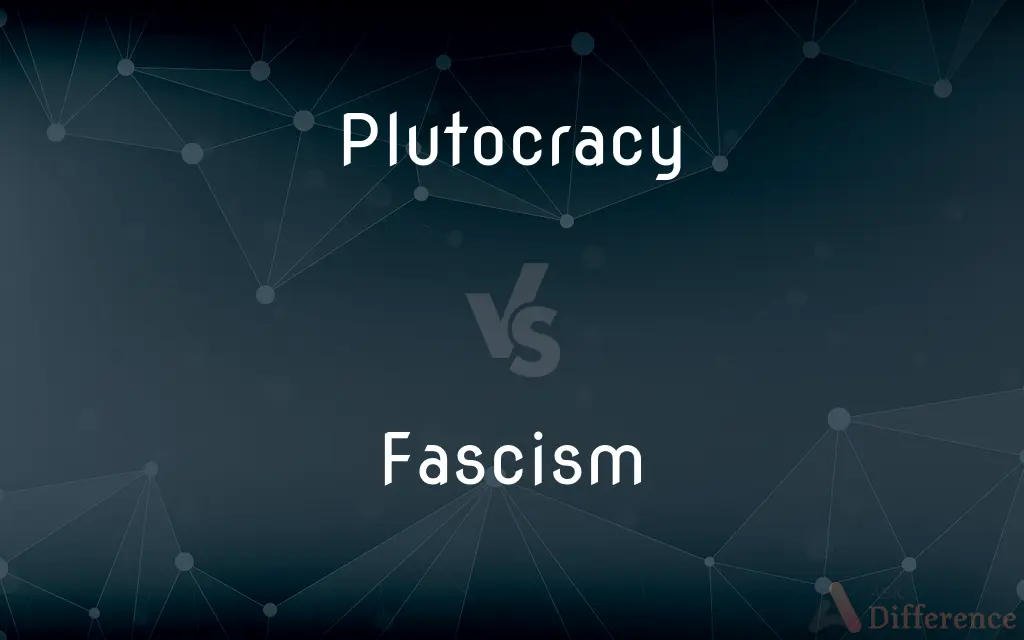Plutocracy vs. Fascism — What's the Difference?
By Urooj Arif & Fiza Rafique — Updated on April 16, 2024
Plutocracy involves governance by the wealthy elite, focusing on economic power; fascism centralizes autocratic power, stressing nationalistic and often oppressive policies.

Difference Between Plutocracy and Fascism
Table of Contents
ADVERTISEMENT
Key Differences
Plutocracy is characterized by the rule of the wealthiest individuals or families, who influence government decisions and policies through their economic clout. On the other hand, fascism is a political ideology that centralizes all power under a dictatorial leader, with an emphasis on aggressive nationalism and often suppression of political opposition.
In a plutocracy, the wealthy may not hold official government positions, but their financial resources allow them to shape legislation, public policy, and even elections to their favor. Whereas, in fascism, the government controls aspects of both public and private life, frequently merging government and business leadership to enforce its policies.
Plutocracy often manifests subtly through the influence on democratic processes and institutions by the rich. On the other hand, fascism openly rejects democracy, employing propaganda, and sometimes violence, to maintain control and stifle dissent.
Economic inequality is a hallmark of plutocratic societies, where wealth begets power and further wealth, often at the expense of the broader populace. Conversely, fascist regimes may use populist rhetoric to gain support, claiming to represent the common man against perceived enemies, though actual policies may not address economic disparities.
Plutocracies typically arise in systems with capitalist economies where money can influence political outcomes. Fascism, however, can emerge in various economic systems but is marked by its totalitarian approach to governance, where the state's power is absolute and individual freedoms are significantly curtailed.
ADVERTISEMENT
Comparison Chart
Definition
Governance by the wealthy
Political ideology with authoritarian nationalism
Power Source
Economic wealth
Centralized autocratic authority
Influence on Policy
Through wealth and economic control
Through total control and propaganda
Economic System
Often capitalist
Can vary, often includes corporatist elements
Public Perception
Subtle and indirect through economic means
Direct and overt, often involves suppression
Compare with Definitions
Plutocracy
Control by the economic elite.
The plutocracy in certain countries controls both the economy and the political sphere indirectly.
Fascism
Anti-democratic and totalitarian.
Fascism involves the eradication of democratic institutions to establish a one-party state.
Plutocracy
A society where wealth equals power.
In a plutocracy, public policies often favor the rich, widening the gap between rich and poor.
Fascism
Nationalistic and authoritarian.
Fascist regimes typically promote extreme patriotism and cultural homogeneity.
Plutocracy
Rule by the wealthiest people.
Ancient Rome was often criticized for becoming a plutocracy as wealthy senators held the most power.
Fascism
Control maintained by force and propaganda.
Fascist governments often rely on a powerful military and controlled media to keep power.
Plutocracy
Governance heavily influenced by money.
Some modern democracies are described as plutocracies due to the significant influence of campaign donors.
Fascism
A political system with a strong, centralized authority.
Fascism in 20th-century Europe was marked by dictatorial power.
Plutocracy
Dominance of the wealthy in political decisions.
Plutocracy thrives where electoral systems are heavily swayed by corporate lobbying.
Fascism
Ideology that suppresses opposition.
Under fascism, freedom of speech is often restricted to prevent dissent.
Plutocracy
A plutocracy (Greek: πλοῦτος, ploutos, 'wealth' and κράτος, kratos, 'power') or plutarchy is a society that is ruled or controlled by people of great wealth or income. The first known use of the term in English dates from 1631.
Fascism
Fascism () is a form of far-right, authoritarian ultranationalism characterized by dictatorial power, forcible suppression of opposition, and strong regimentation of society and of the economy, which came to prominence in early 20th-century Europe. The first fascist movements emerged in Italy during World War I, before spreading to other European countries.
Plutocracy
Government by the wealthy.
Fascism
An authoritarian and nationalistic right-wing system of government and social organization.
Plutocracy
A wealthy class that controls a government.
Fascism
A system of government marked by centralization of authority under a dictator, a capitalist economy subject to stringent governmental controls, violent suppression of the opposition, and typically a policy of belligerent nationalism and racism.
Plutocracy
A government or state in which the wealthy rule.
Fascism
A political philosophy or movement based on or advocating such a system of government.
Plutocracy
Government by the wealthy.
Fascism
Oppressive, dictatorial control.
Plutocracy
A controlling class of the wealthy.
Fascism
Any right-wing, authoritarian, nationalist ideology characterized by centralized, totalitarian governance, strong regimentation of the economy and society, and repression of criticism or opposition.
Plutocracy
A form of government in which the supreme power is lodged in the hands of the wealthy classes; government by the rich; also, a controlling or influential class of rich men.
Fascism
Any system of strong autocracy or oligarchy usually to the extent of bending and breaking the law, race-baiting, and/or violence against largely unarmed populations.
Plutocracy
A political system governed by the wealthy people
Fascism
Any extreme reliance on or enforcement of rules and regulations.
Fascism
A political theory advocating an authoritarian hierarchical government; - opposed to democracy and liberalism.
Fascism
An authoritarian system of government under absolute control of a single dictator, allowing no political opposition, forcibly suppressing dissent, and rigidly controlling most industrial and economic activities. Such regimes usually try to achieve popularity by a strongly nationalistic appeal, often mixed with racism.
Fascism
Specifically, the Fascist movement led by Benito Mussolini in Italy from 1922 to 1943.
Fascism
Broadly, a tendency toward or support of a strongly authoritarian or dictatorial control of government or other organizations; - often used pejoratively in this sense.
Fascism
A political theory advocating an authoritarian hierarchical government (as opposed to democracy or liberalism)
Common Curiosities
How does plutocracy affect democracy?
Plutocracy can undermine democracy by allowing the wealthy to exert disproportionate influence over political processes and decisions.
How do citizens typically respond to plutocratic influences?
Responses can vary from apathy and acceptance to active opposition and calls for reform to reduce the influence of money in politics.
What historical examples exist of fascist regimes?
Historical examples of fascist regimes include Nazi Germany under Adolf Hitler, Fascist Italy under Benito Mussolini, and Francoist Spain under Francisco Franco.
Can a country be both plutocratic and fascist?
Yes, elements of plutocracy and fascism can coexist if a wealthy elite supports a fascist regime that in return favors their interests.
What are typical characteristics of a fascist government?
Fascist governments are characterized by strong, authoritarian leadership, suppression of political opposition, control over the media, and aggressive nationalism.
What economic systems support plutocracy?
Capitalist systems, particularly those with less regulation on campaign finance and lobbying, tend to support plutocratic influences, as wealth can directly impact political power and decision-making.
Is plutocracy legally recognized as a form of government?
Plutocracy is not legally recognized as an official form of government but rather describes a condition where the wealthy have significant control over or influence on government policies and decisions.
What role does propaganda play in fascism compared to plutocracy?
In fascism, propaganda is crucial and extensively used to unify the populace under nationalistic and authoritarian ideals, suppress dissent, and glorify the leader. In plutocracy, propaganda may be used more subtly to shape public opinion in favor of the interests of the wealthy.
How do the general public typically view plutocracies?
Plutocracies are often viewed negatively by the general public, especially when the wealth gap is noticeable and the political influence of the wealthy leads to policies that favor the rich at the expense of the common good.
What is the main difference between plutocracy and fascism?
Plutocracy is rule by the wealthy, using economic power to influence, whereas fascism is a centralized, authoritarian regime that suppresses opposition and controls many aspects of life.
What are the social implications of fascism?
Fascism often leads to social polarization, suppression of minority groups, loss of individual freedoms, and in extreme cases, state-sponsored persecution and violence.
Are there any benefits to a plutocratic system?
Advocates might argue that plutocracy can lead to efficient decision-making and economic growth, as the wealthy have vested interests in a stable and prosperous economy, though this benefit is heavily debated and often criticized for lacking inclusivity.
How do plutocracies and fascisms affect international relations?
Plutocracies may engage in international relations primarily to protect and expand their economic interests, while fascist regimes often pursue aggressive foreign policies driven by nationalist and expansionist ambitions, potentially leading to conflict.
How do fascists gain and maintain power?
Fascists typically gain power through charismatic leadership, exploiting national crises, and utilizing aggressive propaganda. They maintain power by suppressing dissent, controlling the media, and enforcing strict laws against opposition.
Can a democratic country turn into a plutocracy?
Yes, a democratic country can gradually transform into a plutocracy if wealth becomes a significant determinant in political influence and decision-making, overshadowing equal representation.
How does fascism affect economic policies compared to plutocracy?
Fascist regimes often manipulate economic policies to support state goals, bolster nationalism, and control resources, sometimes incorporating corporatist elements. In contrast, plutocracies prioritize policies that favor the economic interests and stability of the wealthy elite, often at the cost of broader economic equality.
What mechanisms can prevent the rise of a plutocracy within a democratic society?
Mechanisms like campaign finance reform, transparent lobbying laws, and strong legal frameworks for political equality can help prevent the rise of plutocracy by limiting the influence of money in politics.
What educational impacts can fascism have on a society?
Fascism typically impacts education by promoting ideological conformity, restricting academic freedom, and often revising curricula to align with nationalist and authoritarian values.
Share Your Discovery

Previous Comparison
Massage vs. Fondle
Next Comparison
Karahi vs. KormaAuthor Spotlight
Written by
Urooj ArifUrooj is a skilled content writer at Ask Difference, known for her exceptional ability to simplify complex topics into engaging and informative content. With a passion for research and a flair for clear, concise writing, she consistently delivers articles that resonate with our diverse audience.
Co-written by
Fiza RafiqueFiza Rafique is a skilled content writer at AskDifference.com, where she meticulously refines and enhances written pieces. Drawing from her vast editorial expertise, Fiza ensures clarity, accuracy, and precision in every article. Passionate about language, she continually seeks to elevate the quality of content for readers worldwide.















































